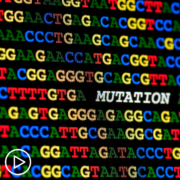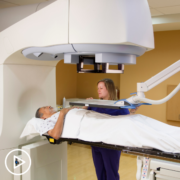Prostate Cancer | Advances in Research and Technology
Prostate Cancer | Advances in Research and Technology from Patient Empowerment Network on Vimeo.
What are the latest prostate cancer research advancements? Expert Dr. Rana McKay discusses recent prostate cancer treatment approvals, ongoing research, and genetic testing developments.
Dr. Rana McKay is an associate clinical professor of medicine at Moores Cancer Center at UC San Diego Health. Learn more about Dr. McKay.
See More from Evolve Prostate Cancer
Related Resources:
Transcript:
Katherine:
Well, let’s dive into developing research and what it could mean for patients. Are there recent research highlights that you could share with the audience?
Dr. McKay:
Absolutely. I think the newest approvals that have occurred in prostate cancer have been the approvals of combination PARP inhibitors, which block the ability of cancer cells to repair their DNA combined with hormonal agents such as abiraterone (Zytiga) or enzalutamide (Xtandi) for patients who have specific mutations in their tumor and their tumor is no longer responding to treatment. Those are the newest FDA approvals that were recently highlighted and shared.
Katherine:
What areas of research do you specialize in?
Dr. McKay:
The areas of research that I specialize in are particularly around novel therapeutics for patients with advanced prostate cancer, biomarker development precision medicine strategies for patients across the spectrum. And actually, also, in the localized setting, thinking about how we can attempt to cure more patients with prostate cancer by integrating our systemic therapy with surgical and radiation strategies to improve survival outcomes for patients and ultimately, cure it for patients by using effective systemic therapy early on so patients never recur.
Katherine:
We’ve been hearing a lot recently about innovations in technology. How are these advances accelerating prostate cancer care?
Dr. McKay:
Innovations of technology have absolutely been revolutionizing prostate cancer care I think from the diagnostic side, there’s new imaging modalities that are getting more refined. On the molecular side, there’s now different kinds of genetic tests. And our ability for us to do these tests, and do them quickly, and get results in real time that we can make decisions on we’ve come a long way from when we first sequenced the human genome. We’re now able to do that so quickly multiple times over in a very streamlined kind of way. And then, I have to say that there’s been tremendous improvement in our modalities of administrating therapies.
So, our therapies are getting more novel, they’re getting more precise. What I mean, by that is targeted radioligand therapy, targeting linking a small molecule that binds PSMA, labeling it with a payload that is radiation therapy or kind of radio therapy/radio particle doing the same thing with chemotherapy, developing antibody drug conjugates. There’s androgen receptor degraders. There’s different ways of administrating immunotherapy by specific antibodies. So, there’s just the different sorts of treatments that are out there.
We’ve just come such a long way from hormone therapy, which is still very important in chemotherapy to other different modes of action with the different systemic treatments we have.
Katherine:
What about individual patients? Is there research into understanding a person’s – just one person’s disease?
Dr. McKay:
Absolutely. I mean, that is in essence, precision medicine. I think we are now molecularly profiling tumors that is standard of care for anybody with advanced disease to undergo hereditary tumor profiling and – or hereditary profiling of just normal cells in the body, if there’s any sort of genetic abnormalities. But also, the tumor itself, and able to do that all for the actual biopsy specimen, or surgical specimen, and also blood. And then, based off of that individual’s genetic makeup, or the genetic makeup of the tumor, or the immune profile of the tumor actually trying to target therapy.
There is a clinical trial that we are eagerly developing through the alliance, which we hope will open to enrollment before the end of the year, called the PREDICT Study. And this study is using that very notion of taking somebody’s DNA and RNA from their specific tumor, and based off of their results, strategizing the treatment around what kind of genetic makeup is in the tumor. And I think we’re moving towards that.
Katherine:
What about common genetic mutations and what are you learning about people who have other genetic mutations like the BRCA mutation?
Dr. McKay:
For patients who have BRCA mutations, first I’ll say, the prevalence of BRCA mutations varies across the stage of prostate cancer that somebody has. In the localized setting, the prevalence is a lot lower on the order of 2 to 4 percent depending on somebody’s risk profile. In the advanced setting, it is higher, 6 to 8 percent. Patients who have BRCA alterations are particularly susceptible to PARP inhibitors, which are oral drugs that can be given that when given in an individual who’s got a BRCA mutation, can cause cell death; can cause a tumor cell to die. And so, that’s a very good thing.
I think the other thing, if thinking about the type of BRCA alterations, if there’s something that’s hereditary, this information is prognostic and predictive in that in can guide how people are going to – how we think they may do and what they may respond to. But it’s also really important because it can inform cascade testing for family members. It could also inform screening for secondary cancers in that individual who has prostate cancer with a known BRCA alteration. So, I think there’s a lot of personalization that happens based off of the molecular profiling results.















